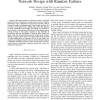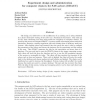1000 search results - page 6 / 200 » Designing for experiences: randomness as a resource |
CORR
2007
Springer
13 years 7 months ago
2007
Springer
—In a sensor network, in practice, the communication among sensors is subject to: 1) errors that can cause failures of links among sensors at random times; 2) costs; and 3) const...
INFOCOM
2011
IEEE
12 years 11 months ago
2011
IEEE
—This paper presents a scheme in which a dedicated backup network is designed to provide protection from random link failures. Upon a link failure in the primary network, traffi...
ICC
2009
IEEE
14 years 2 months ago
2009
IEEE
— In wireless local area networks (WLANs), quality of service (QoS) can be provided by mapping applications with different requirements (e.g., delay and throughput) into one of t...
JSAT
2010
13 years 2 months ago
2010
The design of a SAT-solver or the modification of an existing one is always followed by a phase of intensive testing of the solver on a benchmark of instances. This task can be ve...
CCGRID
2005
IEEE
14 years 1 months ago
2005
IEEE
In multicluster systems, and more generally, in grids, jobs may require co-allocation, i.e., the simultaneous allocation of resources such as processors and input files in multip...


